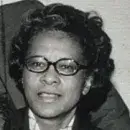
Letitia Woods Brown
Letitia Woods Brown was an educator, community activist, and historian who documented African Americans in the District of Columbia’s early decades. Brown was educated at Tuskegee Institute (B.S., 1935), the Ohio State University (M.A. in history, 1937), and Harvard University (Ph.D. in history, 1966), the first African American woman to earn a history Ph.D. from Harvard. While at Ohio State, Brown participated in sit-ins against whites-only restaurants organized by the NAACP Youth Council.
In 1938, Woods visited Haiti to study Caribbean history and literature. She taught at Tuskegee Institute (1937–1940), LeMoyne College (1940–1945), and Howard University (1961–1970), and served as a Fulbright lecturer at Monash University and Australia National University between 1968 and 1971. She joined George Washington University’s American Studies department from 1971 to 1976, the only full-time faculty member of African descent during those years.
In 1956, Brown moved to Washington, D.C., where she served as an economist at the Bureau of Technical Assistance. She and her husband, Theodore E. Brown, a State Department economist, helped train the first cohort of Peace Corps volunteers in 1961. While living in Washington, her interest in the history of African Americans in the city took root. Brown is the author of Residence Patterns of Negroes in the District of Columbia, 1800–1860 (1971), Free Negroes in the District of Columbia, 1790–1846 (1972), and Washington in the New Era (1972). She co-curated an exhibit at the National Portrait Gallery, “Washington from Banneker to Douglass, 1791–1870” with Elise Lewis. She helped to preserve historical sites important to the D.C. African American community, and was active on the Committee of Landmarks of the National Capital.